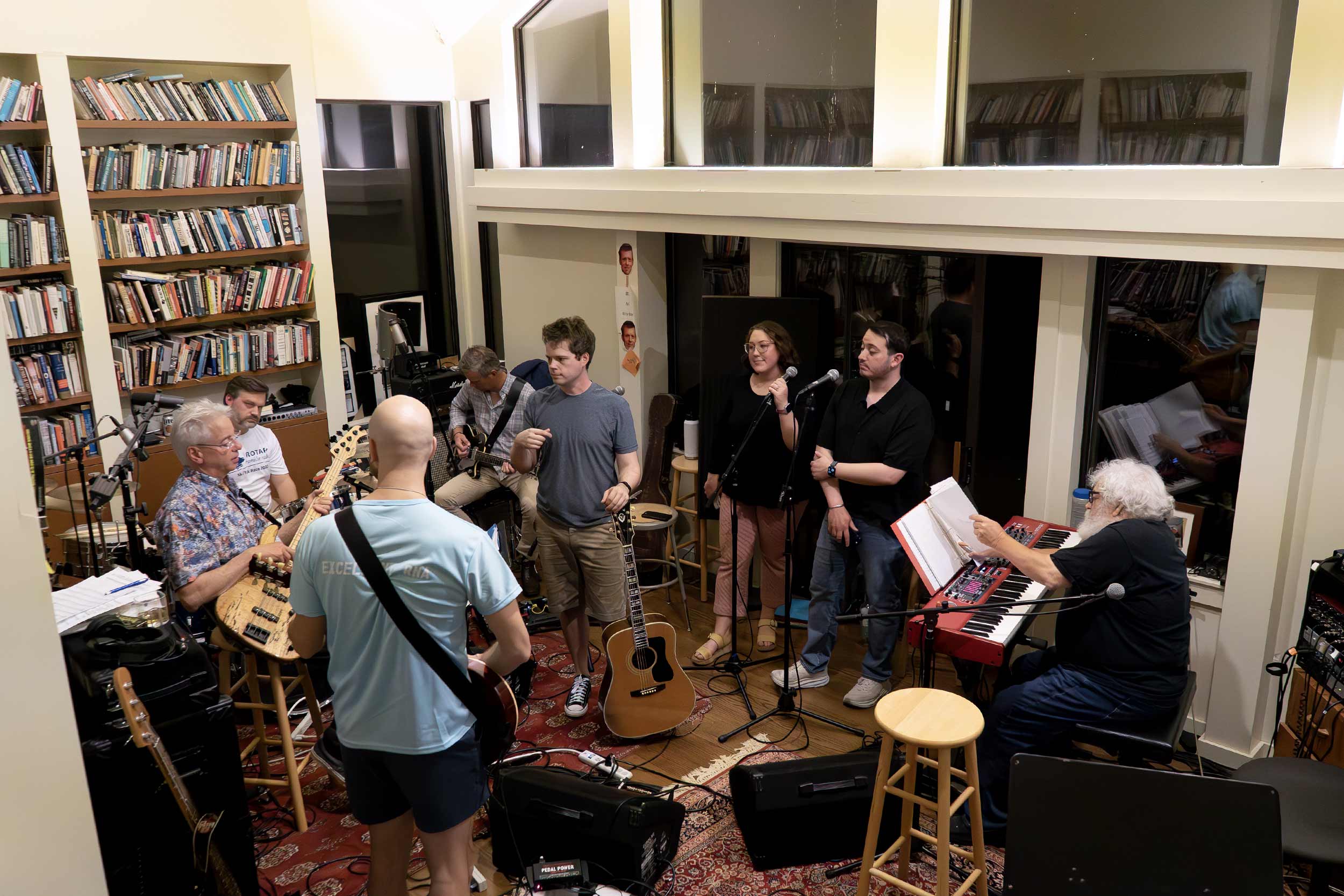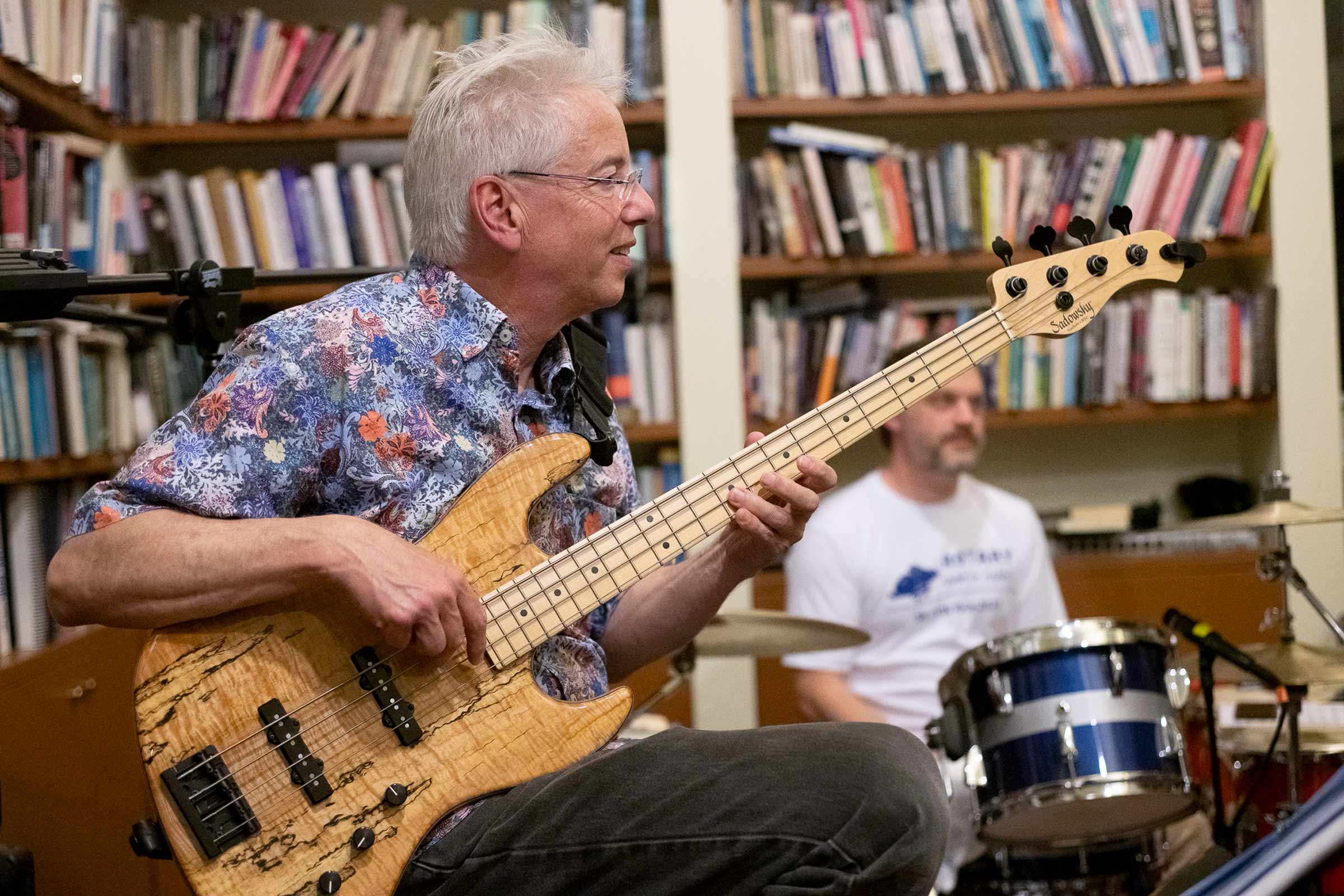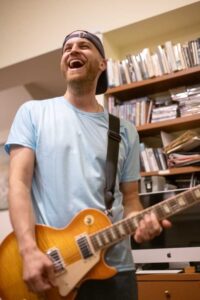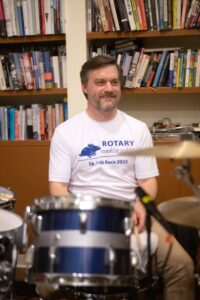Bussiness
Darden Band’s Business Is All About the Music

It’s 7 p.m. on a Sunday and the regular crowd shuffles into professor R. Edward “Ed” Freeman’s home. The University of Virginia’s Darden School of Business is becoming the Darden School of Rock.
There, in a back room of the Albemarle County home, seven Darden comrades shock The Monkees and school Smash Mouth in a raucous take on “I’m a Believer.”
Clearly, the only business on tonight’s syllabus is jamming, with the big test coming at the year-end Darden Carnival on May 2.
The band is called Blues Jam, a conspicuous misnomer for a group of Darden students, faculty, family and friends whose interests go beyond a single genre. Founded in 2003, the band has played weddings, school events, student functions, opened for a couple of pro bands and even gigged a venue or two.
“The band is a little different every time. Sometimes it’s a tight little ensemble and sometimes it’s a big group with horns,” Marc Lipson, the Robert F. Vandell Professor of Business Administration, says. “I think there is something to the whole idea of a relationship between the quantitative – like business and finance – and music. I think it’s not surprising you might see even more musicians in a business school.”
At his day job, Lipson researches how market design and organization affect price formation and liquidity. Tonight, he’s riffing on a custom-built Sadowsky jazz bass, pushing the groove with the band’s long-time drummer John Fitzhugh, a UVA McIntire School of Commerce graduate, now with S&P Global.
“It’s great to be a part of a group that plays good music, but it’s doing it with students, former students, staff and alumni that really makes it,” Lipson says. “It’s kind of an extension of the Darden community brought into the music space.”
R. Edward “Ed” Freeman, a University Professor and the Olsson Professor of Business Administration as well as academic director of Darden’s Institute for Business in Society, plays keyboards and hosts rehearsals for the band he helped found. (Photo by Clara Castle, University Communications)
“I tried recently to write down everybody who’d ever played in the band and, of course, I couldn’t,” admits Freeman, cofounder and the band’s right-hand piano man. “I would say in the last 20 years, it’s probably on the north side of 50 students that have played. We let sort of almost anybody come.”
Ask saxophonist McGregor McCance, who was recently appointed executive editor for Darden communications and marketing.
“I had just taken a new job at Darden, and the first time I visited with Ed Freeman, the topic of the Darden band came up and our experiences playing music,” McCance, who was unable to make rehearsal and replied via email, said. “He has a lot more experience than I do, but he literally said, ‘What are you doing this Friday?’ It was a little nerve-wracking to just show up at his home and try to play along, but the musicians were completely welcoming and gave me tips and encouragement.”

Long-time band member Marc Lipson, the Robert F. Vandell Professor of Business Administration, holds the bottom for Blues Jam on his custom Sadowsky jazz bass. (Photo by Clara Castle, University Communications)
Sometimes it’s the students who impress the band.
“We had a student, Tanesha Duncan, and she has this incredible voice,” says Freeman, a University Professor and the Olsson Professor of Business Administration and academic director of Darden’s Institute for Business in Society. “She said, ‘You know I have some tapes I should bring you guys. I used to sing with this guy and he’s won a couple of Grammys, but you probably never heard of him.’ And I said, ‘Who was it?’ And she said, ‘This guy named John Legend.’”
There are no slouches making up the band’s current lineup, either.
“These guys are great. Skyler did 150 shows a year for six years and he’s also probably the only Darden student in our 57-year history who got their undergraduate degree at Berklee College of Music,” Freeman says.

Darden alumnus Justin Masters serves as first shredder for the business school band. (Photo by Clara Castle, University Communications)
Skyler is Skyler Clark-Hamel, a 2023 MBA graduate now pursing his doctorate. He enrolled in Darden after 15 years songwriting, recording and serving as a Nashville talent agent. Tonight, he’s holding a hardline rhythm on his Guild acoustic guitar and sings lead vocals as lead guitarist Justin Masters countrifies Buck Owens’ “Act Naturally” on his Gibson Les Paul.
“I got the chance to open for some great acts like the Goo Goo Dolls, Plain White T’s and Daughtry. It was great,” Clark-Hamel says. “I ended up working in the business side of it in Nashville as an agent. And then, I came to Darden.”
It was during his application process for Darden that Clark-Hamel first heard about Blues Jam.
“The interviewer asked, ‘Have you heard of Ed Freeman?’ And I’m like, ‘No, I don’t know Ed,” he recalls. “The interviewer says ‘Well, if you decide to come here, you should play in his band.’”
Student Aidan Connell barks out vocals for “Melt With You.” He came to Darden after struggling as a screenwriter in Los Angeles. The band rekindled his love of music, gained from experience in musical theater.
“I am in by virtue of my fiancée, who’s also in the band,” he laughed. “She’s incredibly talented and accomplished and that got noticed pretty quickly and so I got pulled into this orbit. I thought I was going to leave (performing) behind for business school. I thought it was going to be just Excel and all those things. Boy, I was wrong.”
The band goes all to funk on the Dusty Springfield hit “Son of a Preacher Man” and Emily “Em” Benjamin, Connell’s fiancé, proves her vocal chops.
“I was in a group called ‘Voices in Your Head’ in college, which is very well known in a cappella circles,” she says. “We get to Darden and they have a chorus – the Cold Call Chorus – and I joined. We sang at Christmas in a fun crossover between the Cold Call Chorus and Blues Jam and we did this Michael Bublé tune with Skyler as Michael Bublé.”
She was hooked.

John Fitzhugh, a UVA McIntire School of Commerce graduate, has long been the heartbeat of the Blues Jam rhythm section. (Photo by Clara Castle, University Communications)
The band plays on. Adrian Keevil, who earned his MBA and doctorate from Darden and serves as an adjunct professor, fills in the rhythmic dynamics on “Tennessee Whiskey” on his vintage 1970 Gretsch Roc Jet electric guitar. Bandmates agree whatever it is that makes them stand up in front of people to perform is difficult to grasp.
It could, they postulate, be something from their pasts.
“When you’re a kid and you find something that makes you feel special and fulfilled just listening to it, you go, ‘Man, well, maybe I could make other people feel like that,’” Clark-Hamel says. “And the applause is always nice. It makes you feel that all your hard work really paid off.”
“I grew up an evangelical, although it may be hard to believe now,” Freeman says. “I played some piano in church and played the organ. Music was a big part of growing up and it just made me feel great. I think playing music just makes you feel good.”
This article originally appeared in UVA Today.







